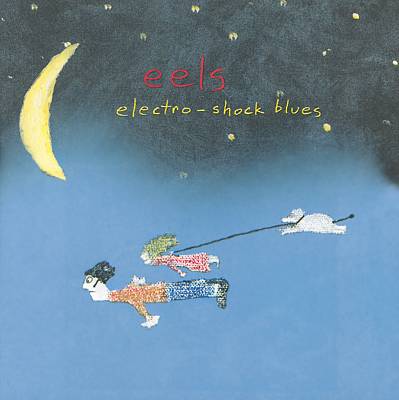7. EelsElectro-Shock Blues

I heard ‘Novocaine For The Soul’ on the radio and bought the album the very next day. And with their second record, I got it expecting more of the same. This was pre-internet, so there wasn’t a lot of information about it, but it would appear that he lost his sister and mum, and so he wrote this record about being in hospital and watching people die. It was extremely sad, and for a teenager it was like, "Holy shit! What is this?!" Kids are always intrigued by sob stories of one kind or another – Nirvana being a perfect example – but this guy had clearly been through a lot. He writes very short and simple yet very affecting songs, not produced in a twee way, but very cold and using lots of samples. They didn’t really sound like a band at all.
Again, they were a three-piece, and a very simple band. He had a really cool voice and a story to tell, and that again really made me think about the fact that the band doesn’t have to be that thing which I always thought they were: that you played your drums and you play your bass, when actually it can be anything you want. That really influenced the way I write music. I used a lot more technology after I got into that album. I started to integrate my live sounds – my guitar for example – with my laptop, and I started using a lot more sampling, thinking I want to be a lot more like Eels.
I think an element of his very black humour has crept into my music. You always get the sense that he is talking about something very grave, but he does so in a slightly distracting way. Take ‘Susan’s House’: it’s got this ridiculous, quite clearly silly motif, which sounds like Neighbours – he knows it does! He’s talking about his problems at Susan’s house as he’s walking past all these awful things in the street, like a kid who has been shot and a pregnant teenager, but it’s couched in this happy, jaunty, slightly sarcastic world, and that is precisely where I’m at in my own music. Like the song ‘Get To Heaven’ is all about the same thing, walking past horrors but with a smile on your face, whistling a jaunty tune. I think a lot of influence came from Mr Everett, because of his outlook on life, where you can be in a very dark position but music doesn’t have to abide by those rules, it can subvert it.
Do you think he has had an impact on the way you write lyrics too?
Yes, definitely, for the same reason: that I think he had a technique where he would say something very serious, followed by something less so, and the feelings you get from contrasting these two things are very recognisable. I think that’s something people feel all the time in their lives. Something good happens and then something bad happens. I don’t think it’s very realistic to talk about one specific emotion for the whole length of a song.


